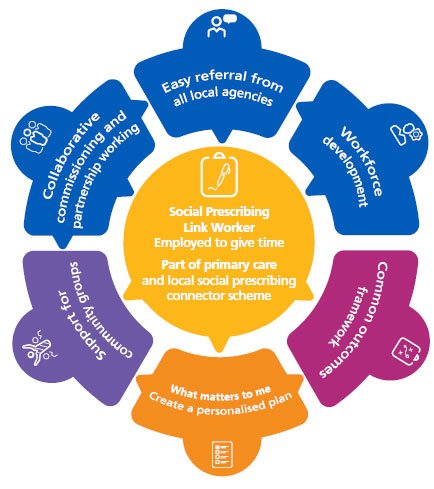Social prescribing – what’s it all about? And how do we get involved?

Ahead of National Social Prescribing Day on 14 March, Rodie looks at what social prescribing is and what it means for faith groups. Special thanks to Dr Henry Akintunde for the practical suggestions in this post, which he shared at the recent Linking Lives UK conference.
Doctors are realising that many of the problems people come to them with have roots that aren’t medical. Maybe someone is experiencing stress because of money worries. Maybe they are depressed because of a bereavement, or their housing situation is affecting their health. Perhaps they are anxious because they have nobody to talk through their worries with. Perhaps they see their GP simply because they are lonely and they know that their doctor will listen.
Social prescribing is the health system’s response to this realisation. Sometimes, as well as or instead of medicine, what the person really needs might be practical help, a friend, physical exercise or good advice. Social prescribing means that a doctor can refer the person to local organisations that provide these things. So, for example, instead of a prescription for pills they might get a ‘prescription’ to attend a gardening club, or help from Citizen’s Advice.
It’s a simple concept – which has already been going on for many years in some places – with a very medical sounding name! This animation (below) by the Healthy London Partnership explains the idea well, and there’s also an informative briefing from health thinktank The King’s Fund if you want to find out more.
The link with faith
You might wonder how a GP is going to know about all the different opportunities available in their area. And the answer is, of course, that they probably don’t. However, the new Long Term Plan for the NHS is making funding available for GP practices to employ a ‘link worker’ whose job it will be to match people with the local activities and services that will help them. Initially each link worker will probably serve between three and five GP practices – and they should be in post by the end of this year.
At FaithAction, we think this is a fantastic opportunity for faith-based organisations to become more closely linked with their local health and care services. We know that our members often offer support that can make a real difference to people’s health and wellbeing – but that this often flies under the radar of the health system. Now, there will be people whose job it is to make the links and know about what’s going on in their local area.
Of course, it’s not all simple. Some groups might find it impossible to help any more people without extra funding – and unfortunately that’s not a part of the social prescribing system as it is at the moment. Nonetheless, where the capacity to help more people is there, this is an opportunity for faith-based organisations to do what they do best: providing the kind of care that complements the health system, and which paid professionals just can’t give.

The elements of social prescribing
https://www.england.nhs.uk/personalisedcare/social-prescribing/
So, how can your organisation get involved?
- Contact your local GP practice(s). Ask to meet with the practice manager, and ask them for the opportunity to do a presentation about your work to the clinical team. GPs have time put aside each month for learning – they could be learning about you!
- You could also go through the Patient Participation Group at the GP practice – contact details should be at the surgery or on the practice’s website.
- Find out from the GP practice if a social prescribing link worker is already in place, and contact them to make sure they know of your work.
- If the practice allows it, leave plenty of leaflets or a poster about your work so that people can get in touch with you directly. But bear in mind that the staff will be much more likely to refer people to you if they have met you and know who you are.
- Become a social prescribing link worker yourself – or encourage someone from your organisation to do so. These jobs will be advertised over the coming months, and if you are already active in your local community and know what’s going on, you could be an ideal candidate. If you are (or someone else from your organisation is) already a link worker – please let us know how you are getting on!
One last thing. Some of our members have told us that GPs are reluctant to refer people to faith-based organisations. We think these doctors are missing a trick. If a faith-based organisation is offering a general service to the whole community, there should be no problem in referring someone to it. And even if they serve only members of a particular faith, it could still be entirely appropriate to refer someone of the same faith to the service. If you have encountered this kind of reluctance, please let us know so that we can take up the matter with the NHS.
Read the latest NHS guidance on social prescribing: www.england.nhs.uk/personalisedcare/social-prescribing


